Middenberm, Delft’s largest skatepark, reopened after an expensive renovation. Why now? And what do skateparks even offer the public? Delta spoke to some locals to find out.
Middenberm Skatepark sits at the middle of the busy intersection of Princess Beatrixlaan and Westlandseweg. (Photo: Oscar Greenwell)
 Rob Vollard, who now works part time as overseer of the skatepark. Photo: Oscar Greenwell
Rob Vollard, who now works part time as overseer of the skatepark. Photo: Oscar Greenwell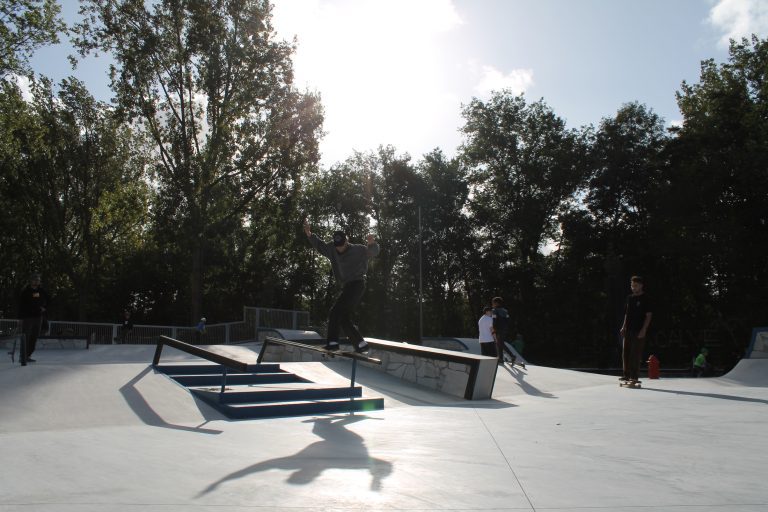 A seasoned skater makes a boardslide on the handrail look easy. Photo: Oscar Greenwell
A seasoned skater makes a boardslide on the handrail look easy. Photo: Oscar Greenwell
This renovation is part of a growing trend. There has been a big increase of interest in skateparks from municipal governments all across the Netherlands. In 2019, The Hague even spent a million euros on an Olympic skateboard training facility. The nearby municipality of Ypenburg renewed their skatepark in 2021, and the neighbouring town of Rijswijk totally revamped its skatepark this year. There is even a section intended for skateboarders being built at the innovative new Leeuwenhoek Park (link in Dutch) opposite Delft Station. But why is all this money being spent on skateparks all of a sudden?
some local skaters chime in and offer their two cents: “after the Covid pandemic, I feel society needs different ways to heal, I think sports facilities like skateparks that are open for everyone help with that” Says Yannick, PHD student at the Faculty of Electrical Engineering, and avid skateboarder.
Derrick, chimes in about the value he sees in skateparks: “A lot of people come from different backgrounds, but everyone’s equal in the skatepark, I think it helps people off the streets because they have access to a diverse community, with a shared activity and passion.”
 A young skater dips a frontside smith grind on the bump-to-rail. You want chips with that dip? Photo: Oscar Greenwell
A young skater dips a frontside smith grind on the bump-to-rail. You want chips with that dip? Photo: Oscar Greenwell
Skatepark Middenberm opened again on 10 October, after a year long renovation that cost almost half a million euros. In recent years there has been a marked increase in skateparks from regional governments in the Netherlands.
Concrete wonderland
The Municipality of Delft spent a total of EUR 470,000 on the skatepark renovation. The new park is predominantly concrete and features an entirely new setup, with obstacles for both seasoned, and novice skateboarders. It is also suitable for other extreme sports such as BMX, scooters, and rollerblades. Derrick, an Engineering student at TU Delft, exclaims: “It’s nice that they invested quite a bit, it turned out really nice, much better than the last park”.
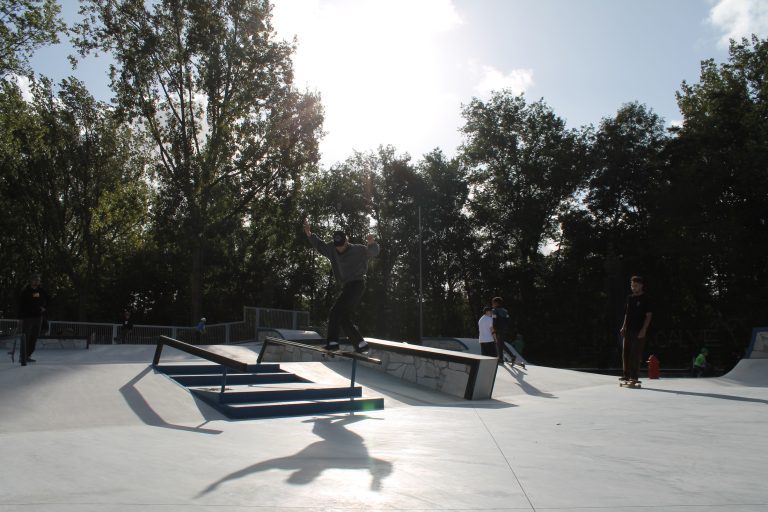 A seasoned skater makes a frontside boardslide on the handrail look easy. Photo: Oscar Greenwell
A seasoned skater makes a frontside boardslide on the handrail look easy. Photo: Oscar GreenwellThis renovation is part of a growing trend. There has been a big increase of interest in skateparks from municipal governments all across the Netherlands. In 2019, The Hague even spent a million euros on an Olympic skateboard training facility. Nearby, the municipality of Ypenburg renewed their skatepark in 2021, and the neighbouring town of Rijswijk totally revamped its skatepark this year. There is even a section intended for skateboarders being built at the innovative new Leeuwenhoek Park opposite Delft Station. But why is all this money being spent on skateparks all of a sudden?
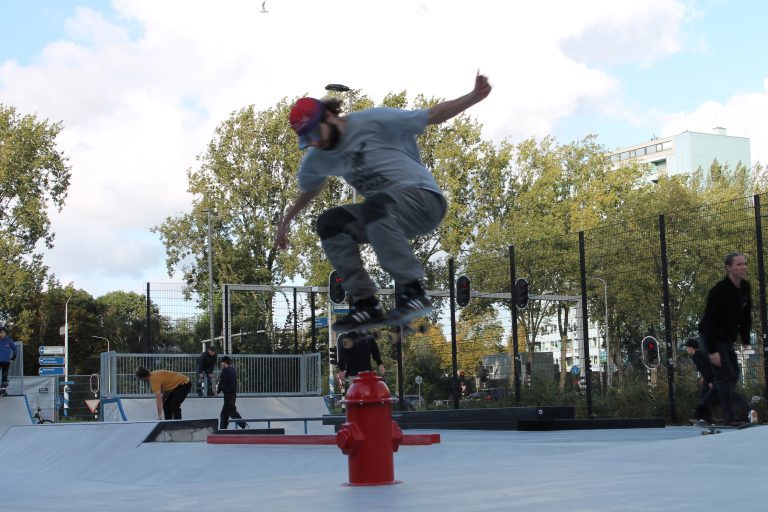 Your trusty editor pops an ollie over the fire hydrant with aplomb. Photo: Jaimy Bhagwanbali
Your trusty editor pops an ollie over the fire hydrant with aplomb. Photo: Jaimy BhagwanbaliGrinding down the municipality
According to Rob Vollard, founder of the Delft Urban Sports association, who was instrumental in acquiring the funding for the new Middenberm, the reason ultimately comes down to the popularity of skateboarding being on an uptick, culminating with it officially debuting as an olympic sport in the Tokyo olympics of 2021. There is thus a desire for up-to-date parks to ‘shred’ among the public, with some youth even holding ‘olympic aspirations’. Rob’s 5 year long campaign to get the skatepark renewed thus was finally taken seriously by the people down at city hall. Rob was adamant that this is what Delft needed, the park was majorly outdated, and even constituted a safety hazard in its previous state, with slippery metal ramps that were falling apart. Rob asked skate-lawyer Max Harteveld to assess the skatepark from a legal standpoint, and he published a ‘damning’ report, which let the municipality know they were currently responsible for any injuries that happen to kids at the park. Rob said of his persistent campaign tactics: “we decided, if you’re [the municipality] not going to listen to us, we will not stop because we want a new skatepark, we will just go until your ears bleed”.
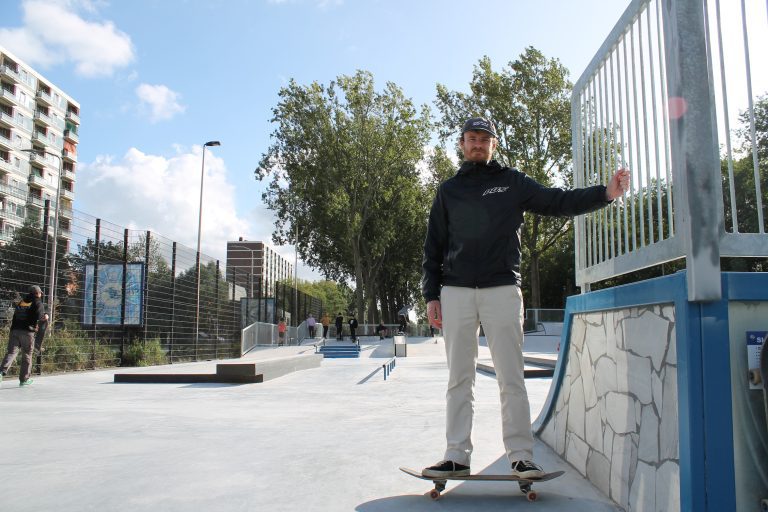 Caption: Rob Vollard, who now works part time as overseer of the skatepark. Photo: Oscar Greenwell
Caption: Rob Vollard, who now works part time as overseer of the skatepark. Photo: Oscar GreenwellGrinding the municipality down
According to Rob Vollard, founder of Delft Urban Sports, who was instrumental in acquiring the funding for the new Middenberm, the reason ultimately comes down to the popularity of skateboarding being on an uptick, culminating with it officially debuting as an Olympic sport in the Tokyo Olympics of 2021. There is thus a desire for up-to-date parks to ‘shred’ among the public, with some youth even holding ‘Olympic aspirations’. Rob’s five year long campaign to get the skatepark renewed thus was finally taken seriously by the people down at city hall. Rob was adamant that this is what Delft needed, the park was majorly outdated, and even constituted a safety hazard in its previous state, with slippery metal ramps that were falling apart. Rob asked skate-lawyer Max Harteveld to assess the skatepark from a legal standpoint, and he published a ‘damning’ report, which let the municipality know they were currently responsible for any injuries that may happen to kids at the park. Rob said of his persistent campaign tactics: “we decided, if you’re [the municipality] not going to listen to us, we will not stop because we want a new skatepark. We will just go on until your ears bleed”.
 A young skater locks into a 50-50 on the ledge. Photo: Oscar Greenwell
A young skater locks into a 50-50 on the ledge. Photo: Oscar GreenwellYannick, a 25 year old PhD student at the Faculty of Electrical Engineering and avid skateboarder, is also here at the park polishing his skills. He offers his two cents on the topic. “After the Covid pandemic, I feel society needs different ways to heal. I think sports facilities like skateparks that are open to everyone help.”
Derrick chimes in about the value he sees in skateparks. “A lot of people come from different backgrounds, but everyone’s equal in the skatepark. I think it helps people get off the streets because they have access to a diverse community with a shared activity and passion.”
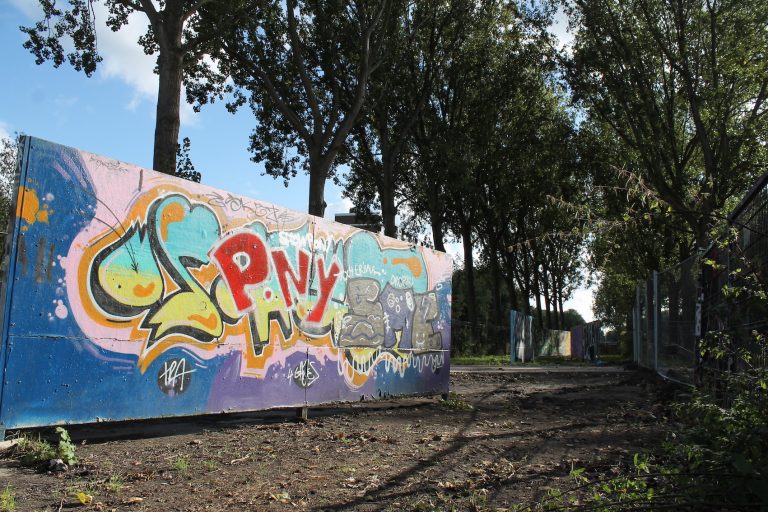 The back section of the park, offering walls for graffiti artists to practice on. Photo: Oscar Greenwell
The back section of the park, offering walls for graffiti artists to practice on. Photo: Oscar Greenwell
 A young skater dips a frontside smith grind on the bump-to-rail. You want chips with that dip? Photo: Oscar Greenwell
A young skater dips a frontside smith grind on the bump-to-rail. You want chips with that dip? Photo: Oscar Greenwell
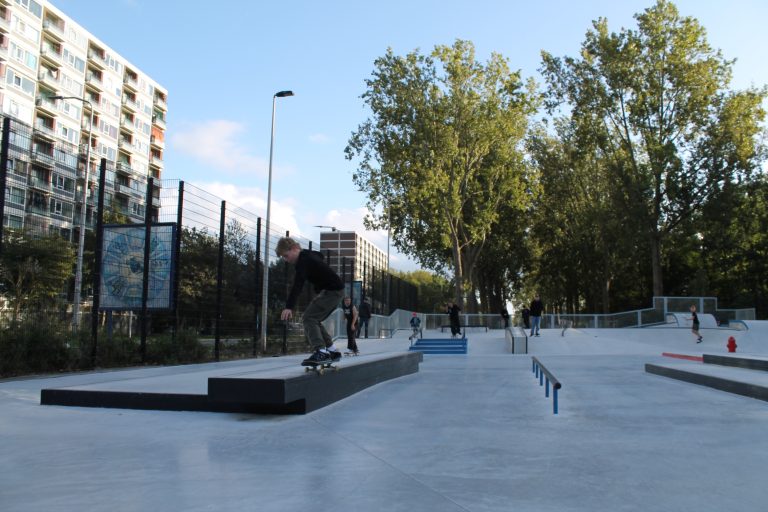 Caption: A young skater locks into a 50-50 grind on the ledge deftly. Photo: Oscar Greenwell
Caption: A young skater locks into a 50-50 grind on the ledge deftly. Photo: Oscar Greenwell
A melting pot
What do skateparks offer to the larger community besides just a place to pop ollies and kickflips? Skateparks are a unique sporting facility because they encourage a sport which is all at once individual, yet highly social. This keeps children who don’t fit into traditional sports teams healthy and entertained, making them less likely to get into trouble, explains Rob. There were some grumblings from the municipality about skateparks being a den for youth to engage in unsavoury pastimes such as the use of drugs and alcohol, or illegal graffiti. But, there already was a skatepark anyway, it just was in an awful state. Rob explains: “I said to them [the municipality] you’ve got to facilitate things for these kids as well. If you don’t, they’ll go out and find their own spots to hang out, and get up to worse things.” Now there is even a new area at the back of the skatepark where graffiti artists can hone their skills. Rob elaborates: “It’s a hobby. It’s not like they want to destroy the park, they’re artists”.
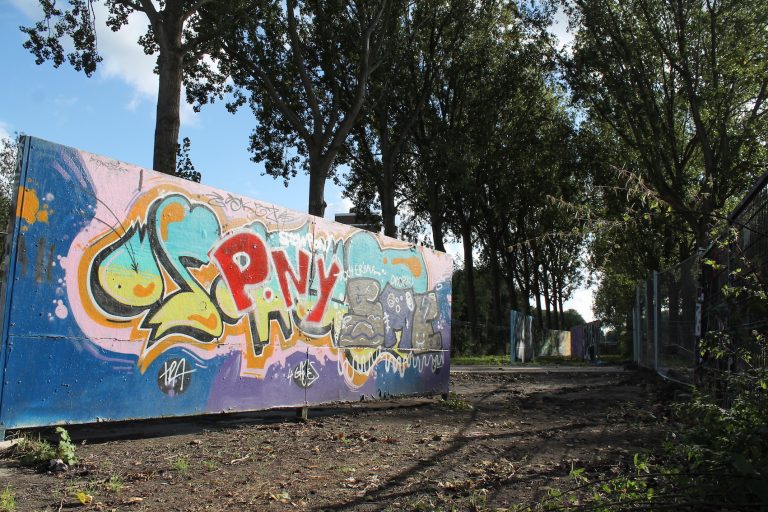 The back section of the park, offering walls for graffiti artists to practise on. Photo: Oscar Greenwell
The back section of the park, offering walls for graffiti artists to practise on. Photo: Oscar Greenwell A young skater locks into a 50-50 grind on the ledge deftly. Photo: Oscar Greenwell
A young skater locks into a 50-50 grind on the ledge deftly. Photo: Oscar Greenwell
Derrick chimes in about the value he sees in skateparks. “A lot of people come from different backgrounds, but everyone’s equal in the skatepark. I think it helps people get off the streets because they have access to a diverse community with a shared activity and passion.”
 Caption: The back section of the park, offering walls for graffiti artists to practise on. Photo: Oscar Greenwell
Caption: The back section of the park, offering walls for graffiti artists to practise on. Photo: Oscar Greenwell
A melting pot
What do skateparks offer to the larger community besides just a place to pop ollies and kickflips? Skateparks are a unique sporting facility because they encourage a sport which is all at once individual, yet highly social. This keeps children who don’t fit into traditional sports teams healthy and entertained, making them less likely to get into trouble, explains Rob. There were some grumblings from the municipality about skateparks being a den for youth to engage in unsavoury pastimes such as the use of drugs and alcohol, or illegal graffiti. But, there already was a skatepark anyway, it just was in an awful state. Rob explains: “I said to them [the municipality] you’ve got to facilitate things for these kids as well. If you don’t, they’ll go out and find their own spots to hang out, and get up to worse things.” Now there is even a new area at the back of the skatepark where graffiti artists can hone their skills. Rob elaborates: “It’s a hobby. It’s not like they want to destroy the park, they’re artists”.
 A young skater dips a frontside smith grind on the bump-to-rail. You want chips with that dip? Photo: Oscar Greenwell
A young skater dips a frontside smith grind on the bump-to-rail. You want chips with that dip? Photo: Oscar Greenwell
Yannick, a 25 year old PhD student at the Faculty of Electrical Engineering and avid skateboarder, is also here at the park polishing his skills. He offers his two cents on the topic. “After the Covid pandemic, I feel society needs different ways to heal. I think sports facilities like skateparks that are open to everyone help.”
Derrick chimes in about the value he sees in skateparks. “A lot of people come from different backgrounds, but everyone’s equal in the skatepark. I think it helps people get off the streets because they have access to a diverse community with a shared activity and passion.”
English only
Skatepark Middenberm opened again on 10 October, after a year long renovation. In recent years there has been a marked increase in skateparks built by regional governments in the Netherlands. Why?
Heaven is a halfpipe
The Municipality of Delft spent a total of EUR 470,000 on the skatepark renovation. The new park is predominantly concrete and features an entirely new setup, with obstacles for both seasoned, and novice skateboarders. It is also suitable for other extreme sports such as BMX, scooters, and rollerblades. Derrick, a mechanical engineering student at TU Delft, exclaims: “It’s nice that they invested quite a bit, it turned out really nice, much better than the last park”.
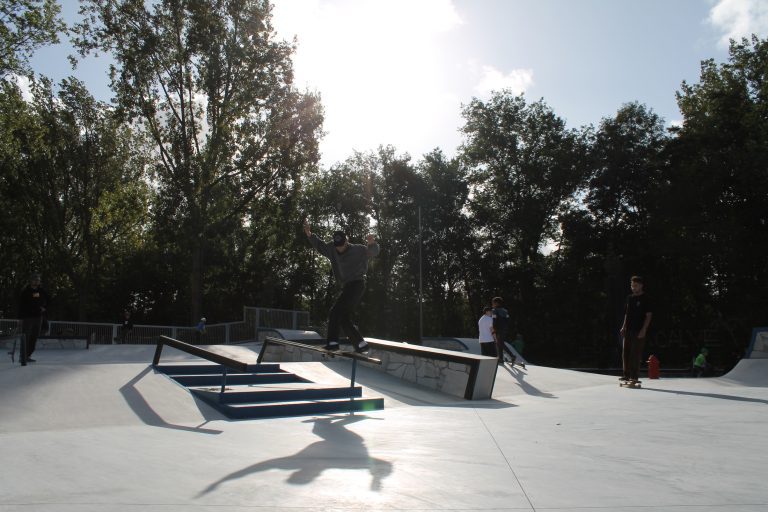 A seasoned skater makes a frontside boardslide on the handrail look easy. (Photo: Oscar Greenwell)
A seasoned skater makes a frontside boardslide on the handrail look easy. (Photo: Oscar Greenwell)
This renovation is part of a growing trend. There has been a big increase of interest in skateparks from municipal governments all across the Netherlands. In 2019, The Hague even spent a million euros on an Olympic skateboard training facility.
Nearby, the municipality of Ypenburg renewed their skatepark in 2021, and the neighbouring town of Rijswijk totally revamped its skatepark this year. There is even a section intended for skateboarders being built at the innovative new Van Leeuwenhoek Park (in Dutch) opposite Delft Station. But why is all this money being spent on skateparks all of a sudden?
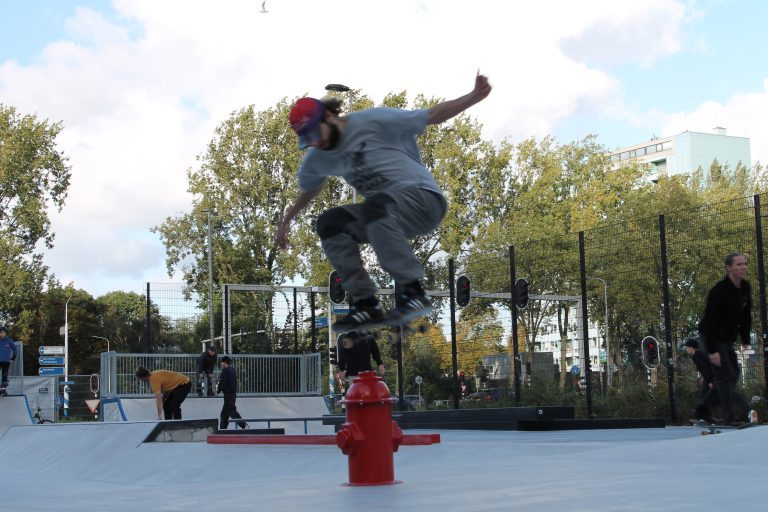 Your trusty editor pops an ollie over the fire hydrant with aplomb. (Photo: Jaimy Bhagwanbali)
Your trusty editor pops an ollie over the fire hydrant with aplomb. (Photo: Jaimy Bhagwanbali)
Grinding down the municipality
According to Rob Vollaard, founder of the Delft Urban Sports association (in Dutch), who was instrumental in acquiring the funding for the new Middenberm, the reason ultimately comes down to the popularity of skateboarding being on an uptick, culminating with it officially debuting as an Olympic sport in the Tokyo Olympics of 2021.
There is thus a desire for up-to-date parks to ‘shred’ among the public, with some youth even holding ‘Olympic aspirations’. Rob’s five year long campaign to get the skatepark renewed was consequently finally taken seriously by the folks down at city hall.
Rob was adamant that this is what Delft needed, the park was majorly outdated, and even constituted a safety hazard in its previous state, with slippery metal ramps that were falling apart. Rob asked skate-lawyer Max Harteveld to assess the skatepark from a legal standpoint, and he published a ‘damning’ report, which let the municipality know they were currently responsible for any injuries that may happen to kids at the park.
Rob said of his persistent campaign tactics: “We decided, if you are [the municipality, Eds.] not going to listen to us, we will not stop because we want a new skatepark. We will just go on until your ears bleed.”
 Rob Vollaard, who now works part time as overseer of the skatepark. (Photo: Oscar Greenwell)
Rob Vollaard, who now works part time as overseer of the skatepark. (Photo: Oscar Greenwell)
A melting pot
What do skateparks offer to the larger community besides just a place to pop ollies and kickflips? Skateparks are a unique sporting facility because they encourage a sport which is all at once individual, yet highly social. This keeps children who don’t fit into traditional sports teams healthy and entertained, making them less likely to get into trouble, explains Rob.
There were some grumblings from the municipality about skateparks being a den for youth to engage in unsavoury pastimes such as the use of drugs and alcohol, or illegal graffiti. But, there already was a skatepark anyway, it just was in an awful state.
Rob explains: “I said to them [the municipality, Eds.] you’ve got to facilitate things for these kids as well. If you don’t, they’ll go out and find their own spots to hang out, and get up to worse things.” Now there is even a new area at the back of the skatepark where graffiti artists can hone their skills. Rob elaborates: “It’s a hobby. It’s not like they want to destroy the park, they’re artists.”
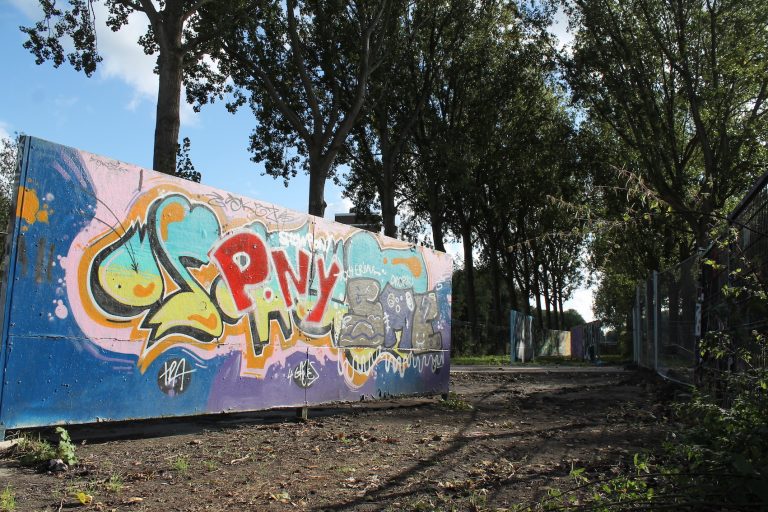 The back section of the park, offering walls for graffiti artists to practise on. (Photo: Oscar Greenwell)
The back section of the park, offering walls for graffiti artists to practise on. (Photo: Oscar Greenwell)
Yannick, a 25 year old PhD student at the Faculty of Electrical Engineering, Mathematics and Computer Science and avid skateboarder, is also here at the park polishing his skills. He offers his two cents on the topic. “After the Covid pandemic, I feel society needs different ways to heal. I think sports facilities like skateparks that are open to everyone help.”
Derrick chimes in about the value he sees in skateparks. “A lot of people come from different backgrounds, but everyone’s equal in the skatepark. I think it helps people get off the streets because they have access to a diverse community with a shared activity and passion.”
 A young skater dips a frontside smith grind on the bump-to-rail. You want chips with that dip? (Photo: Oscar Greenwell)
A young skater dips a frontside smith grind on the bump-to-rail. You want chips with that dip? (Photo: Oscar Greenwell)Oscar Greenwell / Editor


Comments are closed.